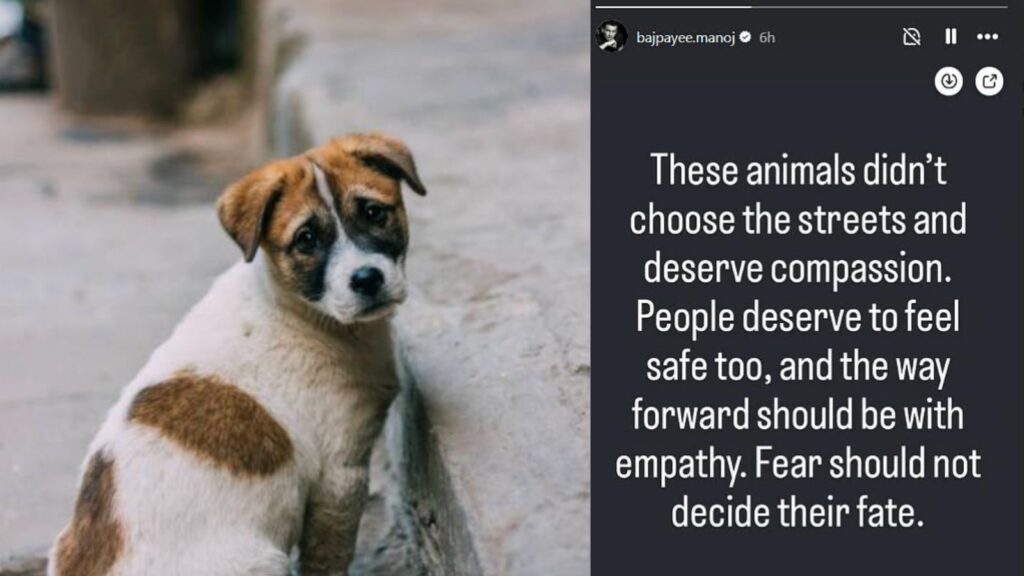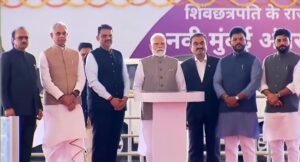“They Didn’t Choose the Streets”: Manoj Bajpayee Calls for Compassion Amid Supreme Court’s Stray Dog Verdict

“They Didn’t Choose the Streets”: Manoj Bajpayee Calls for Compassion Amid Supreme Court’s Stray Dog Verdict
In a country as vast and complex as India, not every being is given the freedom to choose its circumstances. Stray dogs—often born on pavements, abandoned by careless owners, or left behind in urban sprawl—are among the most voiceless victims of this lack of choice. They didn’t pick the streets; they ended up there because of a broken system, human neglect, and a collective failure to care.
Now, with the Supreme Court’s recent verdict ordering that stray dogs in Delhi NCR be removed from public spaces and not released back, an intense nationwide debate has erupted—centered around fear, safety, compassion, and justice.
As discussions heat up across social media and public platforms, actor Manoj Bajpayee has added his voice to the growing conversation—but with a tone different from many others. While Bollywood celebrities such as Adah Sharma, Varun Dhawan, Janhvi Kapoor, and Raveena Tandon have openly criticized the decision, Bajpayee has taken a more measured and empathetic stance, acknowledging both sides of the emotional and ethical conflict.
Sharing his thoughts via Instagram Stories on August 18, the Gangs of Wasseypur star wrote:
“These animals didn’t choose the streets and deserve compassion. People deserve to feel safe, too, and the way forward should be empathy. Fear should not decide their fate.”
His words have struck a chord, especially at a time when polarisation is easy and empathy is rare. Bajpayee’s message doesn’t take sides—it asks us to look beyond the noise, to understand that the conversation isn’t simply about animals vs. humans, but about how we respond to vulnerability and danger.
The Supreme Court, in its August 11 order, instructed civic bodies in Delhi, Noida, Ghaziabad, Gurugram, and Faridabad to ensure localities are made free of stray dogs. The directive also prohibited the release of captured dogs back onto the streets, prompting immediate and widespread concern among animal rights groups and citizens.
Protests broke out in Uttar Pradesh, Delhi, Tamil Nadu, and West Bengal, as activists argued that the ruling could lead to large-scale suffering for strays, many of whom may not survive in shelters or may simply disappear without public accountability.
Amid this growing outrage, a three-judge bench—Justices Vikram Nath, Sandeep Mehta, and NV Anjaria—has reserved its order on petitions calling for a stay on the Supreme Court’s directive. The bench confirmed that an interim order would be passed after reviewing all arguments presented.
Representing the Delhi government, Solicitor General Tushar Mehta defended the court’s stance, saying:
“In a democracy, there is a vocal majority and one who silently suffers. We had seen videos of people eating chicken, eggs, etc., and then claiming to be animal lovers. It was an issue to be resolved. Children were dying… Sterilisation did not stop rabies; even if you immunised them, that did not stop mutilation of children.”
He called attention to alarming data from the World Health Organisation, stating that India recorded 37 lakh dog bites in 2024, leading to 305 deaths from rabies, most of them involving children under 15.
“Dogs do not have to be killed… they have to be separated. Parents cannot send children out to play. Nobody is an animal hater,” Mehta emphasized.
His words paint a harrowing picture—of real fear, of real suffering—and underscore the fact that many people, especially children, have paid the price for years of inaction and ineffective implementation of sterilisation and vaccination programs.
Still, the question remains: What do we owe to those who had no choice in how they got here? Manoj Bajpayee’s statement doesn’t ignore the pain of those affected by stray dog attacks, nor does it diminish the fear that many families feel. Instead, it asks for a path led by empathy—not panic.
Because the truth is, fear is valid, but it cannot be the compass by which we decide another creature’s fate. Dogs, like humans, respond to how they’re treated. If a society teaches them aggression through abuse or abandonment, then we, as a collective, share in the responsibility.
In the end, this is not just a legal issue—it is a moral one. As a nation, we must choose—not between people and animals, but between reactive fear and responsible compassion. And perhaps, as Bajpayee reminds us, the answer lies not in choosing sides, but in choosing empathy. Because while they didn’t choose the streets, we can choose how we treat them now.










